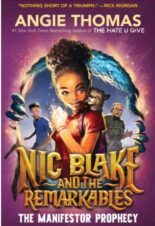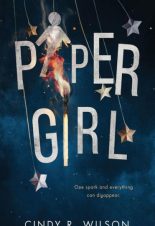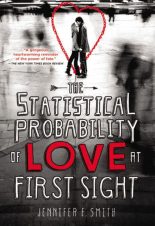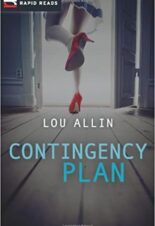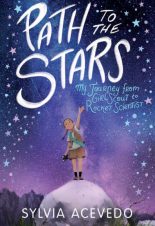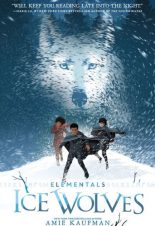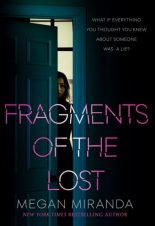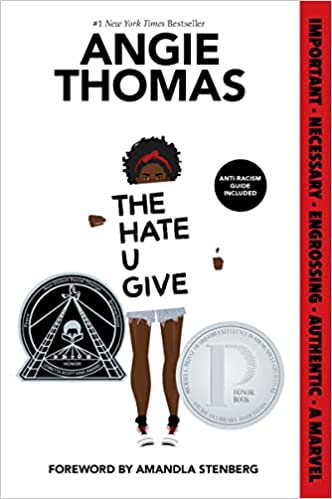
Buy This Book
Other books by Angie Thomas
“This is bigger than me and Khalil though. This is about Us, with a capital U; everybody who looks like us, feels like us, and is experiencing this pain with us despite not knowing me or Khalil. My silence isn’t helping Us,” Starr. –The Hate U Give
The Hate U Give
by Angie Thomas
AR Test
14+
Score
3.9
464
Angie Thomas’ novel centers around Starr, a sixteen-year-old girl, who within the first thirty pages of the book witnesses her friend Khalil’s brutal murder at the hands of a police officer. The rest of the book follows Starr’s journey of grieving for her friend, testifying to the police, and also dealing with the instances of racism that occur at her predominantly white private school, Williamson. Starr ultimately agrees to testify before a grand jury, to combat their narratives that Khalil is a “drug dealer and gangbanger,” and also to testify that Khalil was doing nothing wrong; he was needlessly murdered.
Identifying and combating systemic oppression is a major theme in The Hate U Give. In the hopes of getting justice, Starr decides to speak to the police about Khalil’s murder; Starr’s family, her father in particular, supports her decision. Starr realizes that speaking out, speaking to the police, and speaking to the grand jury and the media is ultimately her own way of fighting for Khalil. Starr thinks, “This is how I fight, with my voice.” In her televised interview, Starr risks being attacked by corrupt officers, as well as by gang violence as she implicates the gang’s leader by explaining, “Khalil was forced to sell drugs for him” because “his mom’s life was in danger . . . that’s the only reason he’d ever do something like that.” Starr also grows to realize that, “I don’t understand how everyone can make it seem like it’s okay he got killed if he was a drug dealer and a gangbanger.” Starr connects Khalil’s murder and police brutality in general to assumptions, “[the officer] assumed that we were up to no good. Because we’re black and because of where we live. We were just two kids minding our business. His assumption killed Khalil.”
Starr is an extremely sympathetic character who exemplifies feeling split into two different people: “Garden Heights Starr” in her hometown and “Williamson Starr” at her majority white private school. She desperately wants to feel “the normal where I don’t have to choose which Starr to be. The normal where nobody tells you how sorry they are or talks about ‘Khalil the drug dealer.’ Just . . . normal.” On top of grieving her friend’s death and trying to get him justice, Starr is navigating this sense of dual identity, which many readers may relate to.
Starr’s father is also an extremely sympathetic character and a strong role model for Starr. He talks about getting out of the King Lord gang. He says, “I became a King Lord when I was twelve. Shit, that was the only way to survive . . . Then I became a daddy, and I realized that King Lord shit ain’t worth dying for.” He describes being a “d-boy” and selling drugs as part of his job within the gang. Starr’s father went to prison for three years, “[he] took that charge” instead of letting the leader, King, go to prison for life. By the end of the book, her dad is organizing members from both gangs to work together to protect their neighborhood from riots as the grand jury verdict approaches. He says, “We all mad, but burning down our neighborhood ain’t gonna fix it . . . Y’all gotta come together somehow, man . . . For the sake of the Garden.”
Another major theme is Starr confronting toxic friendship—specifically with her friend Hailey from Williamson Prep. Starr feels distanced from her friend after Hailey “unfollowed my Tumblr.” Starr explains, “I once posted a picture of Emmet Till, a fourteen-year-old black boy who was murdered for whistling at a white woman in 1955. His mutilated body didn’t look human. Hailey texted me immediately after, freaking out . . .She couldn’t believe I would reblog such an awful picture.” Hailey also makes a racist comment to Starr when they’re playing basketball. Hailey says, “Pretend the ball is some fried chicken. Bet you’ll stay on it then.” Starr starts to confront Hailey by saying, “You made a fried chicken comment to the only black girl in the room.” But Starr is not able to truly call Hailey’s behavior out until later. Starr discovers that Hailey is bothered by Starr posting “Petitions. The Black Panther pictures. That post on those little girls who were killed in that church . . . ” Hailey said she did not want to see “all the ‘black stuff,’” showing her true ignorance and the underlying reason for her comments towards Starr.
Readers who are prepared to handle frequent language and instances of violence will find Starr and her entire family to be strong and relatable characters who truly demonstrate what it means to advocate for yourself and for others. The Hate U Give shows a zoomed-in look at how systemic racism affects Starr, her family, and their community as a whole. The book ends with an important message, that “People are realizing and shouting and marching and demanding. They’re not forgetting. I think that’s the most important part.” These vital themes covered in Thomas’ novel make it a must-read. Explore more books that highlight racism and the need for change by reading I’m Not Dying with You Tonight by Kimberly Jones & Gilly Segal and Stamped: Racism, Antiracism, and You by Jason Reynolds & Ibram X. Kendi.
Sexual Content
- Starr mentions how the guys at the party “grind so close to girls that they just about need condoms.” She goes on to explain, “Spring in Garden Heights doesn’t always bring love but it promises babies in the winter.”
- Starr’s friend, Kenya, tells her about drama with another girl. “You’re so lucky you go to that white-people school and don’t have to deal with hoes like that.”
- Starr recalls her first kiss with her childhood friend, Khalil. They kissed at Vacation Bible school.
- When Starr and her boyfriend, Chris, were kissing, her mom and uncle walked in on them. “They pointed out that friends don’t kiss like that.”
- Starr describes the incident with Chris that made her angry. “Fooling around isn’t new for us, and when Chris slipped his hand in my shorts, I didn’t think anything of it. Then he got me going, and I really wasn’t thinking . . . And right as I was at that moment, he stopped, reached into his pocket, and pulled out a condom. He raised his eyebrows at me, silently asking for an invitation to go all the way.” Starr is angry because “he knew I wasn’t ready for that, we already talked about it, and yet he had a condom? He said he wanted to be responsible, but I said if I’m not ready, I’m not ready.”
- Starr reveals that her half-brother, Seven, came out of a one-time encounter between their father and a prostitute, “It’s no secret that my big brother is a result of a ‘for hire’ session Daddy had with [a prostitute] after a fight with Momma.”
- Starr and Chris begin to passionately kiss. “I kiss his lips . . . He kisses me back, and soon we’re making out like it’s the only thing we know how to do. It’s not enough. My hands travel below his chest, and he’s bulging in more than his arms. I start unzipping his jeans . . . ” But Chris stops her because she’s “not in a good place,” as she is extremely stressed waiting for the grand jury’s verdict.
Violence
- Starr meets up with Khalil at a party, when suddenly a fight breaks out and she hears, “Pop! A shot rings out. I duck. Pop! A second shot. The crowd stampedes towards the door.” Later in the novel, readers learn that a young boy was shot in an encounter between rival gangs.
- Khalil explains that he believes the shooting may have been connected to the local gang violence. “Garden Heights has been a battlefield for the past two months over some stupid territory wars.”
- While Khalil is driving Starr home, police pull him over because his tail light’s broken. For no reason, the officer is aggressive and forces Khalil out of the car. After the officer pats Khalil down “two more times,” Starr thinks the encounter is over. But suddenly, as Khalil walks back to his car, the officer shoots him three times. It is described in detail, “One. Khalil’s body jerks. Blood splatters from his back . . . Two. Khalil gasps . . . Three. Khalil looks at me, stunned. He falls to the ground.” This horrifying scene is described over five pages.
- Starr immediately runs to her friend and sees his body “in the street like it’s an exhibit.” While she sits with her friend’s body, “Officer One-Fifteen yells at me, pointing the same gun he killed my friend with.”
- After Khalil’s murder, Starr has nightmares about another friend’s murder, her friend Natasha, who was killed by an unknown gang member in a drive-by shooting. “It happened six years ago, but I still remember everything from that day . . .Natasha was splashing in the water, all happy and stuff. Then—Pow! Pow! Pow! I dove into a rosebush. At first I thought it was me, ‘cause I had blood on my shirt. The thorns on the rosebush got me, that’s all. It was Natasha though.” Starr says, “[Natasha’s] blood mixed in with the water, and all you could see was a red river flowing down the street.”
- Starr’s half-brother, Seven, says his stepdad, King, is abusive towards his mom and sisters. “He’ll beat her, she’ll put him out. Then he’ll come back.”
- Starr’s dad saw his cousin being killed. He says, “A drug deal turned into a robbery, and he got shot in the head twice. Right in front of me.”
- In Starr’s neighborhood, patrolling officers pull up to her father’s store and when they see his name on his ID, they force him to the ground. A cop yells, “On the ground, face-down!” Then, “The black cop keeps his knee on Daddy’s back as he searches him. He pats him down once, twice, three times, just like One-Fifteen did to Khalil. Nothing.”
- While watching a basketball game with her family, Starr suddenly hears gunshots. “Glass shatters. Then, pop, pop, pop, pop. Gunshots. ‘Get down!’ Daddy yells . . . Momma’s on top of us, and she wraps her arms around us.” This scene goes on for two pages. Starr feels that this attack is “clearly a message for me” about her speaking to the grand jury.
- Hailey tells Starr that, “Somebody was gonna kill [Khalil] eventually,” and, “The cop probably did everyone a favor. One less drug dealer . . . ” Starr “slam[s her] fist against the side of Hailey’s face.” They fight for two pages.
- Lesha, the King Lord’s gang leader’s wife, threatens Starr’s family. Lesha says, “Can’t wait till King fuck y’all up for letting that girl snitch on him on TV.”
- Starr joins a peaceful protest and speaks to a crowd, but just as she begins speaking about Khalil’s death, the police throw tear gas at her and the other protestors. “The can of tear gas sails toward us from the cops. It lands beside the patrol car.” Starr picks up the can because “any second it’ll combust,” and “[chucks] it back at the cops.”
- During the riots, Starr, Seven, and Chris search for her father. When they check on his store, they are trapped when, “A glass bottle with flaming cloth—Whoomf! The store is suddenly lit bright orange . . . Flames lick the ceiling and block the door.” This intense scene lasts three pages. All the protestors struggle to breathe because of the tear gas, but no one is shown to be gravely injured.
Drugs and Alcohol
- The opening scene of the book shows Starr at a party, “A haze lingers over the room, smelling like weed.”
- Starr tries a drink at the party, but spits it out because, “this is way stronger than what I’m used to. They shouldn’t even call it punch, just straight up liquor.”
- Kenya’s friends ask Starr about her school and the parties there. She asks, “I bet they be doing Molly and shit, don’t they? White kids love popping pills.”
- Starr reveals that Khalil’s mom was not present for much of his life because she was “on crack.”
- Rosalie, Khalil’s grandmother, tells Starr’s family that Khalil “was selling that stuff” to pay for Rosalie’s cancer treatments, but that “he wanted to stop” because it was so dangerous.
- Reflecting on her hometown, Starr says, “Garden Heights has dope boys on corners, but downtown people in business suits wait for crossing lights to change. I wonder if they ever hear the gunshots and shit in my neighborhood.”
Language
- The teenagers frequently use profanity such as shit, hell, damn, goddamn, bitch, fuck, and ass.
- A recurring exclamation in the book is one of Tupac’s expressions, “Thug Life,” which Khalil explains to Starr stands for, “The Hate U Give Little Infants Fucks Everybody.” He says it means, “what society gives us as youth, it bites them in the ass when we wild out.”
- A member of the gang The Garden Disciples calls Starr’s brother the N-word and asks, “You Kinging?” Trying to find out if he is with the other gang.
- Starr sees Khalil at a party and says, “The sea of people parts for him like he’s a brown-skinned Moses.”
- Occasionally, Starr exclaims, “Thank Black Jesus.”
- Starr discusses how everyone at her school expects her to date “the only other black kid in eleventh grade . . .Because apparently when it’s two of us, we have to be on some Noah’s Ark type shit and pair up . . .”
Supernatural
- None
Spiritual Content
- Starr explains, “Problem is it would’ve taken Black Jesus to convince my parents to let me come. Now Black Jesus will have to save me if they find out I’m here.”
- Starr discusses her family’s views on religion: “Momma became a member of Christ Temple Church when she was in Nana’s belly. Daddy believes in Black Jesus but follows the Black Panther’s Ten-Point Program more than the Ten Commandments. He agrees with the Nation of Islam on some stuff, but he can’t get over the fact they may have killed Malcom X.”
- Before school, Starr’s father leads their family in prayer saying, “Black Jesus, watch over my babies today.”
- Before Starr testifies in front of the grand jury, her father leads their family in a prayer: “Black Jesus, thank you for this blessing . . . Now, Lord, tomorrow is a big day for my baby girl as she goes before this grand jury. Please give her peace and courage . . . I ask for some mercy, God. That’s all. Mercy for Garden Heights, for Khalil’s family, for Starr.”
- Starr’s father explains why he named his son Seven, “Seven, that’s a holy number. The number of perfection . . . you’re the perfect gift God gave me.”
Other books by Angie Thomas
“This is bigger than me and Khalil though. This is about Us, with a capital U; everybody who looks like us, feels like us, and is experiencing this pain with us despite not knowing me or Khalil. My silence isn’t helping Us,” Starr. –The Hate U Give
Latest Reviews
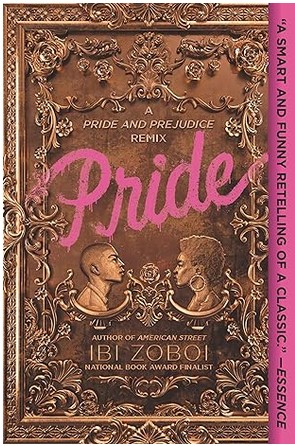
Pride: A Pride & Prejudice Remix
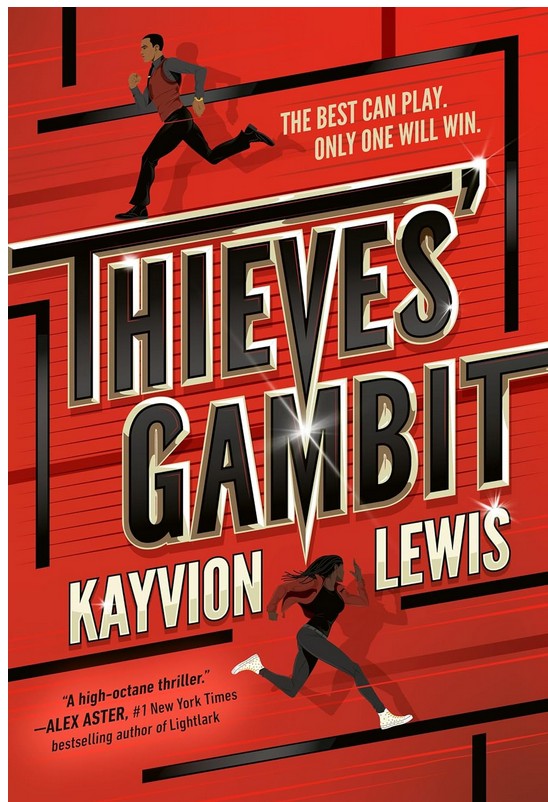
Thieves’ Gambit #1
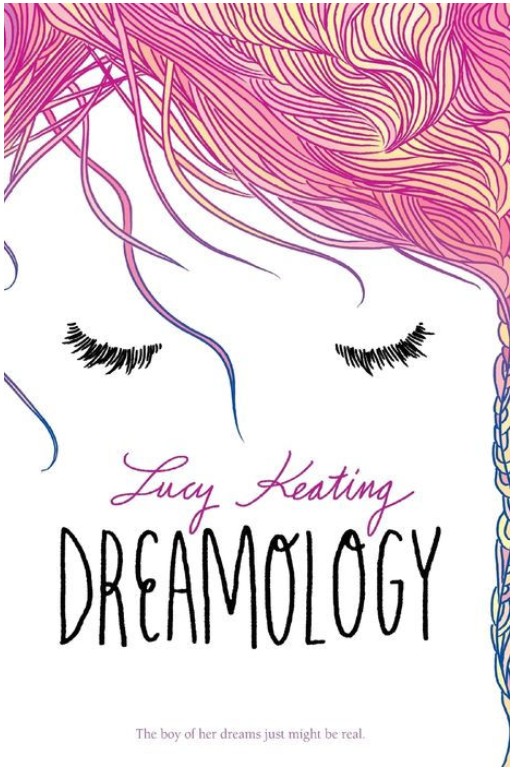
Dreamology
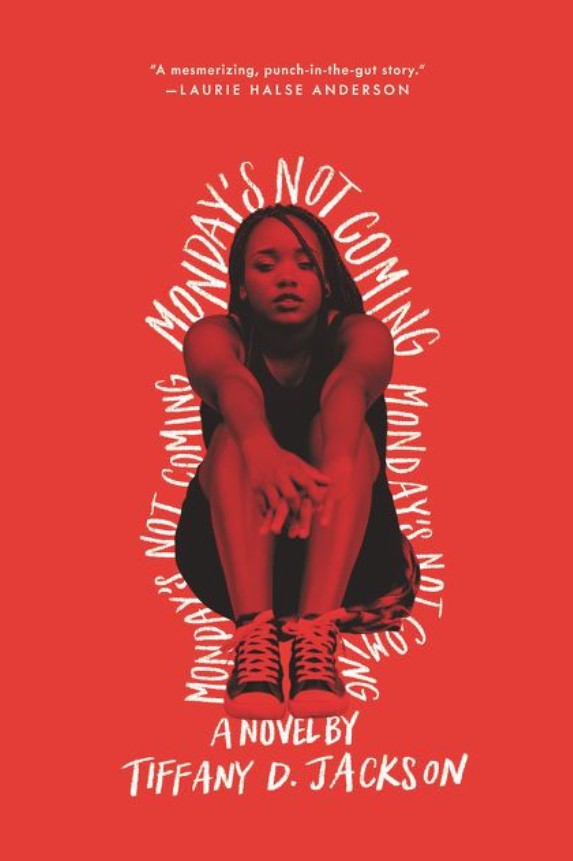
Monday’s Not Coming
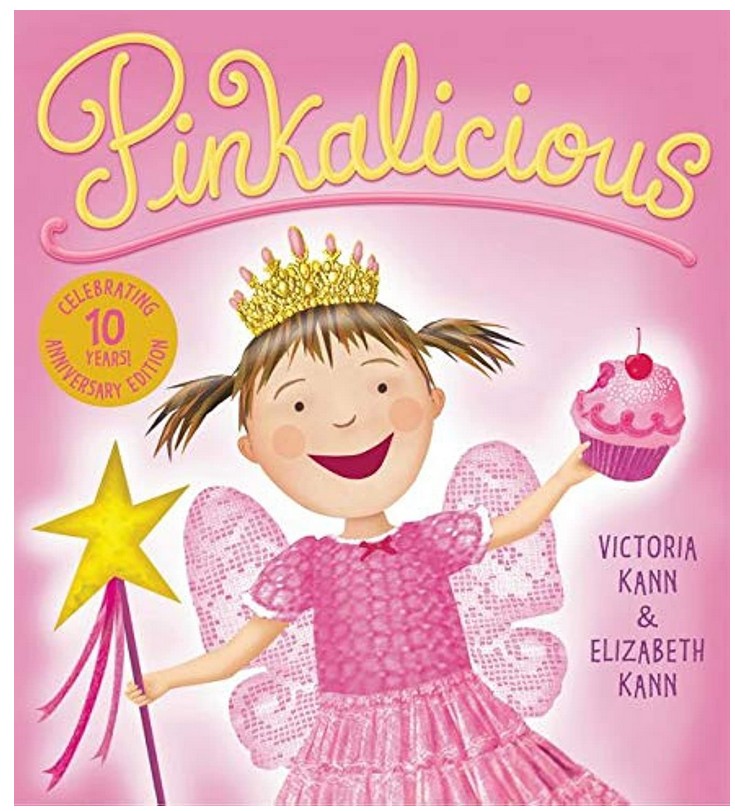
Pinkalicious

Driven

Goodbye Days

Blood of Troy

Will’s Race for Home

